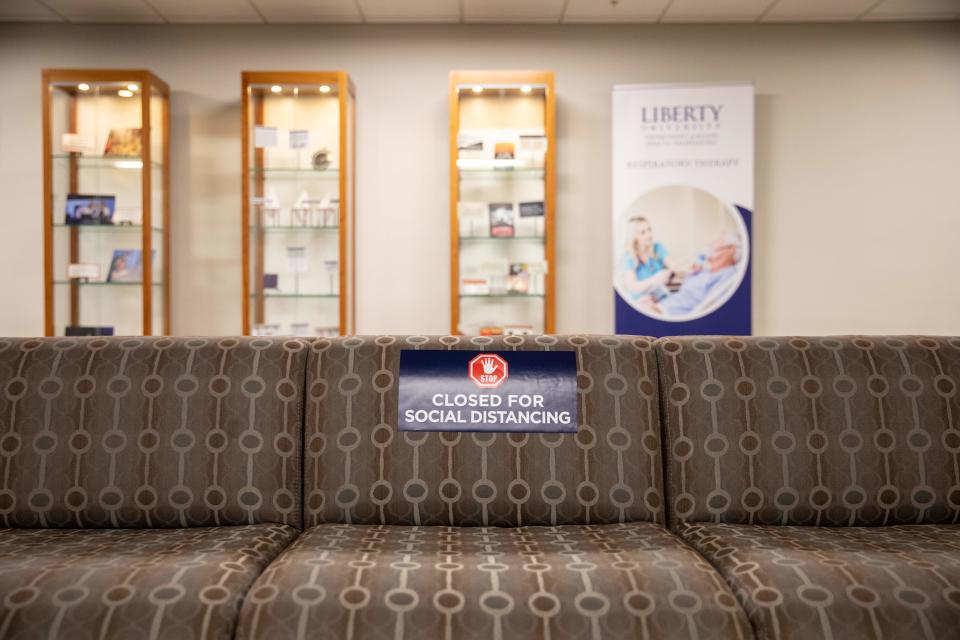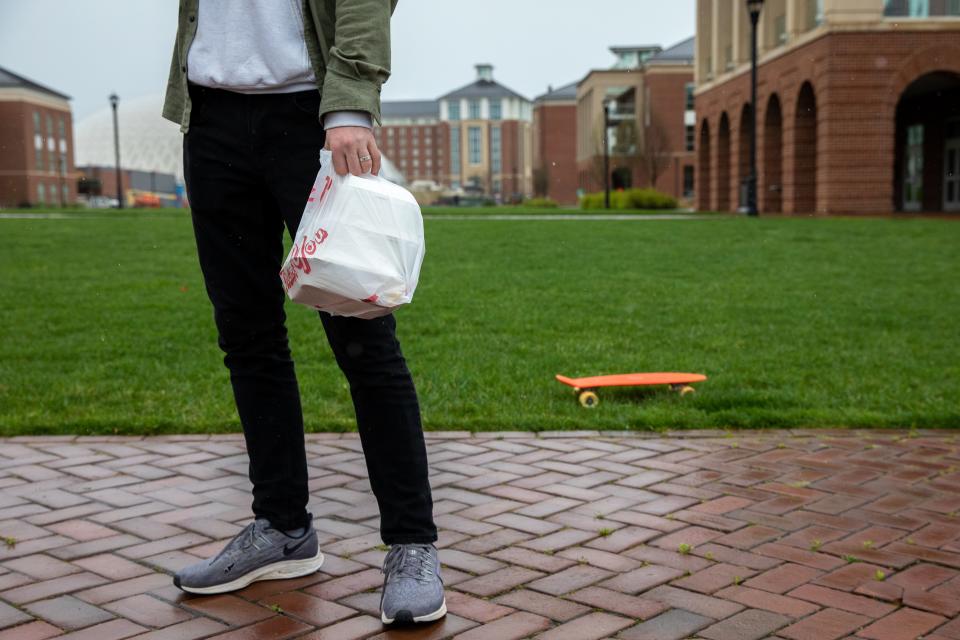Liberty University students choose sides after fallout from coronavirus reporting

The New York Times reported this week that almost a dozen Liberty University students have come down with COVID-19 symptoms since the school reopened last week, according to a bombshell article published Sunday that cites a local physician in Lynchburg, Va., where the evangelical university is situated.
“We’ve lost the ability to corral this thing,” Dr. Thomas W. Eppes Jr. said he told Liberty University president Jerry Falwell Jr., according to the article. The Times identified Eppes as the head of the school’s student health service, but he does not appear on the Liberty University website and a school spokesman told Yahoo News he has no official connection to the university. Dr. Eppes did not return a call to Yahoo News for comment.
Many students at the university said they were unconcerned about the risks of returning to classes.
According to the Times, three students were reportedly referred to a local hospital for testing, while eight others were told to self-isolate.
But Liberty University officials have since pushed back on these claims, calling the Times story “fake news” in a piece posted to the school website Sunday night. “The New York Times published a false and misleading story on March 29 claiming that Liberty University ‘students started getting sick’ after students returned to campus from spring break,” the post reads. “The truth is a far different story.”
The post continued, “despite the Times’ sensational headline and story lead, in fact, Liberty is only aware of three off-campus students who were sufficiently symptomatic to qualify for COVID-19 testing, two of which did not leave Lynchburg for Spring Break and one of which tested negative during Spring Break.”
On Monday, the Liberty University’s official Twitter account published a tweet that read, “So sad the failing New York Times had to quote local Dr. with no official role at LU about COVID-19 only for clickbait when it knew his data was incomplete and unofficial.”
So sad the failing @nytimes had to quote local Dr. with no official role at LU about COVID-19 only for clickbait when it knew his data was incomplete and unofficial.
THANKS Dr. Eppes for researching more and making a public correction that no resident students have symptoms.— Liberty University (@LibertyU) March 31, 2020
Liberty spokesman Scott Lamb declined an interview with Yahoo News on this story, but on Monday evening he offered the school’s latest statement, which claims that 1,045 students remained on Liberty’s campus as of Sunday night. There are three students (both residential and online) who have been tested for COVID-19, of which one — a recent graduate residing locally with family — tested positive, the school said. There are an additional five students on campus who are self-quarantining because of symptoms or due to recent travel to New York City.
Also on Monday, Virginia Gov. Ralph Northam issued a stay-at-home order for the state effective until June 10. Virginia residents may only leave their home to seek medical attention, work, care for family or household members, obtain groceries and prescriptions, and engage in outdoor activity. The order also bans gatherings of more than 10 people. Liberty says the school will close down its remaining in-person instruction and inform its residential students of new travel restrictions and guidelines.

It’s an entirely new climate with new rules for students at Liberty University. And it’s a scenario many critics saw coming when Falwell welcomed students and faculty back to campus last week amid the country’s worsening outbreak of the coronavirus.
One outspoken undergraduate voice, senior Calum Best, who also chose to stay on campus, questions if Liberty students can stay safe. “It’s theoretically possible to have an open college campus with a small number of residential students and keep everyone isolated,” Best told Yahoo News. “I thought this might be the case at Liberty. It’s been disappointing since then to see the number of students breaking social distancing guidelines, but I still think that it’s possible to be safe.”
Best was quoted in the Times piece, calling out Falwell and his administration’s attempts to quiet dissent. “The only real question of fact was whether Dr. Eppes did actually say to the New York Times reporter that 12 students were symptomatic,” Best said. He added that in spite of the school’s response to the Times article, “the piece remains rock solid and worth standing by, especially the parts about President Falwell’s misleading communication [and] students breaking social distancing.”

Falwell, now dealing with fallout from the Times piece, maintains he has it under control. “Liberty will be notifying the community as deemed appropriate and required by law,” Falwell said Sunday. He added that any student now returning to campus would be required to self-quarantine for 14 days.
The news has shaken critics, but students like computer science major Clayton Didinsky say that, despite the outside chatter, they will believe what the university tells them.
“When it comes to either choosing to believe my school or the New York Times, I'm going to choose my school just because they have no reason to lie to us,” Didinsky told Yahoo News. “But I overall think that it's a messy situation. I think that Liberty really should just communicate with their students [better].”
Didinsky chose to drive back home to California when the school reopened last week. He did not agree with Falwell’s decision to reopen campus because he felt it endangered students like himself who suffer from preexisting health conditions. (Didinsky has mitochondrial disease.) He says the decision isn’t just Falwell’s. “I think there's a lot more that goes into it than a lot of us see,” Didinsky said. “And I think that overall, Jerry probably gets a big say in it.”
For other students, like track and field standout Jaqueze Durham of Orlando, Fla., staying on campus was the best option. “I just think it's easier for us to be here than be at home,” Durham said. “I come from a house of 10 siblings and I wouldn't want to give it to my 2-year-old sister or give it to my older brother who has children.”
Durham admitted that he was concerned when he saw the Times piece, but reasoned that “you can get it anywhere.” He feels confident that the university is doing what it can to ensure student safety with the rules in place.
Freshman Ethan Hale also chose to stay on campus and says he questions the news reports that students have coronavirus symptoms. “I am living on campus and I'm going to probably get the news first or I would hope to at least,” Hale said. “I don't know exactly if those are facts or rumors.”
Regardless, Hale says staying on campus was what was best for him because going to his home in Fairbanks, Alaska, to study online would have made school nearly impossible. “For me, it was the time difference and the fact that I have six siblings,” said Hale. “It’s the [lack of] space in my house and I wouldn't really be able to get work done for an 8 a.m. class that I'd have to be there at 4 a.m. ... So for me, this space that I have here is really great because it's like I can do my work and focus on other things.”
Hale says that ultimately students need to decide what is best for them.
“It's a matter of choice,” Hale said. “Be safe. If you feel like you were being safe on campus, stay on campus. Make those smart decisions. But people who are on the outside, I don't think should be putting that feedback back in because it's not their decision.”
_____
Read more from Yahoo News:



